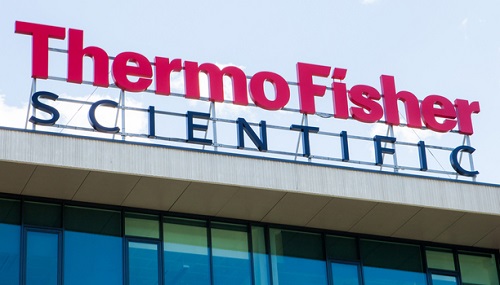
March 30, 2022 – Thermo Fisher Scientific Inc., the world leader in serving science, today announced its collaboration with the National Institutes of Health (NIH) Rapid Acceleration of Diagnostics (RADx) Initiative, Helix, and Rosalind aimed at developing a new genotyping method for SARS-CoV-2 that could speed up the identification of variants as they emerge.
Utilizing a Polymerase Chain Reaction (PCR)-based genotyping approach that can be implemented in any testing lab performing real-time PCR, this program allows for a significant scale up of SARS-CoV-2 surveillance efforts in the United States. Data generated from this program will be available to the public through the Rosalind Tracker website. This effort was funded by the National Institute of Biomedical Imaging and Bioengineering (NIBIB) as part of the NIH RADx Initiative to increase testing capacity and accessibility for the virus that causes COVID-19.
The rapid emergence of new SARS-CoV-2 variants raises several important public health questions, such as their ability to cause disease and their impact on vaccine efficacy. This makes it critical to track variants to better understand transmission patterns and possible consequences on health care resources. Next-Generation Sequencing (NGS) is the conventional method for detecting and tracing new variants, with about 5 percent of randomly selected SARS-CoV-2 positive samples in the United States being sent for variant identification. NGS, however, can possibly take up to 21 days from a positive result before variant data is available in public repositories.
With the addition of genotyping, labs can classify a high percentage of positive samples and provide information within two to three days. They can also reduce costs for strain subtyping as compared to NGS. Samples that cannot be assigned to a known variant through the genotyping approach become prime candidates to detect new or emerging variants more rapidly.
A recent paper outlines the performance of this method for identifying markers and assigning lineages to several SARS-CoV-2 variants, including previously characterized Variants of Concern (VOC) such as Alpha, Beta, Gamma and Delta. In addition, the study describes how this approach can be rapidly adapted to develop a targeted panel for currently circulating strains, such as Delta and Omicron, to allow for large-scale surveillance in routine testing laboratories.
The rapid selection and validation of highly sensitive and specific biomarkers for SARS-CoV-2 variants was enabled with the ROSALIND platform during the collaborative initiative. This dynamic, cloud-based data analytics platform was able to act as a centralized tool for labs by aggregating and analyzing the data in a real-time dashboard format. Thermo Fisher has updated the TaqMan SARS-CoV-2 Mutation Panel* to include the four markers that can detect the Omicron and Delta variants with high precision.
